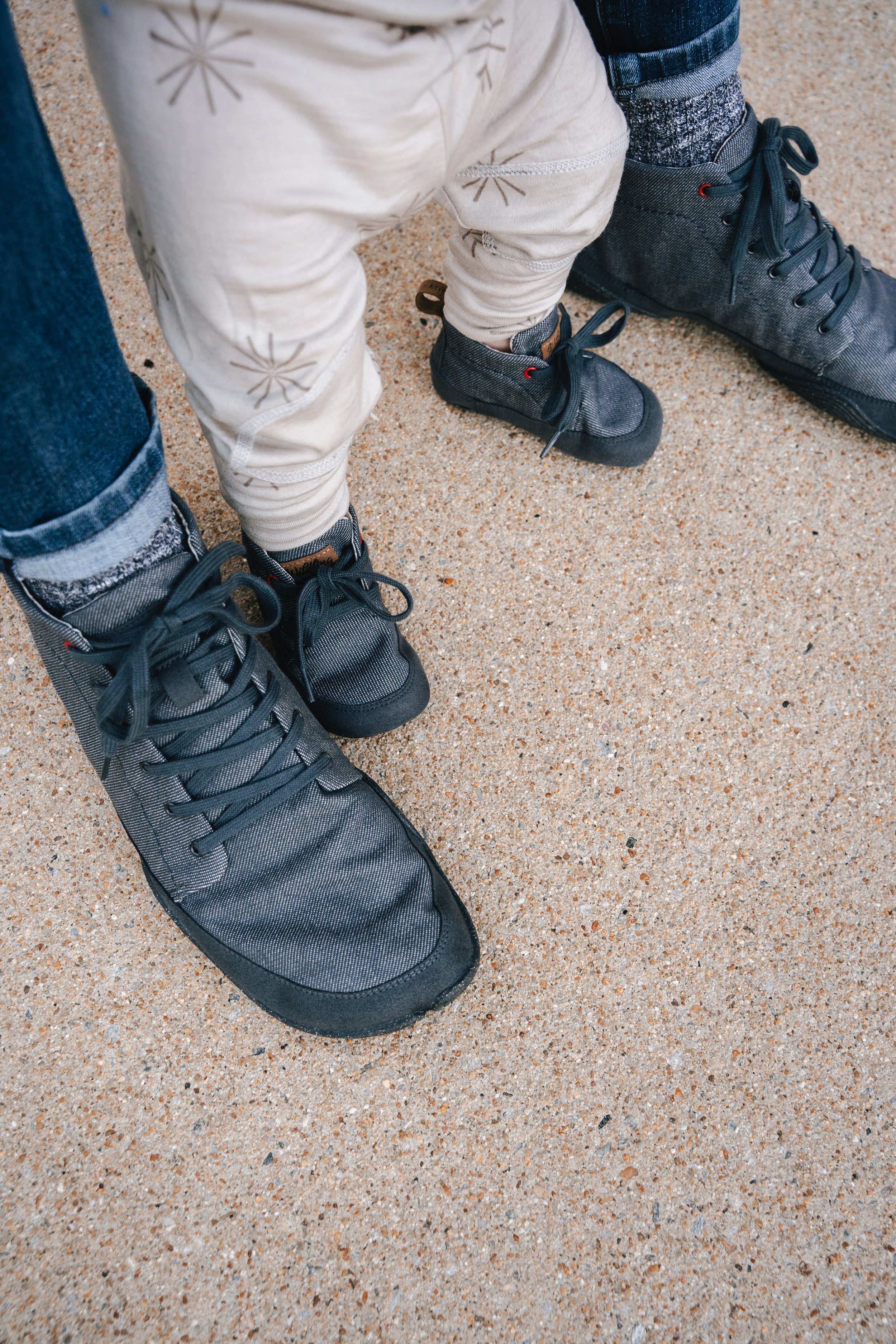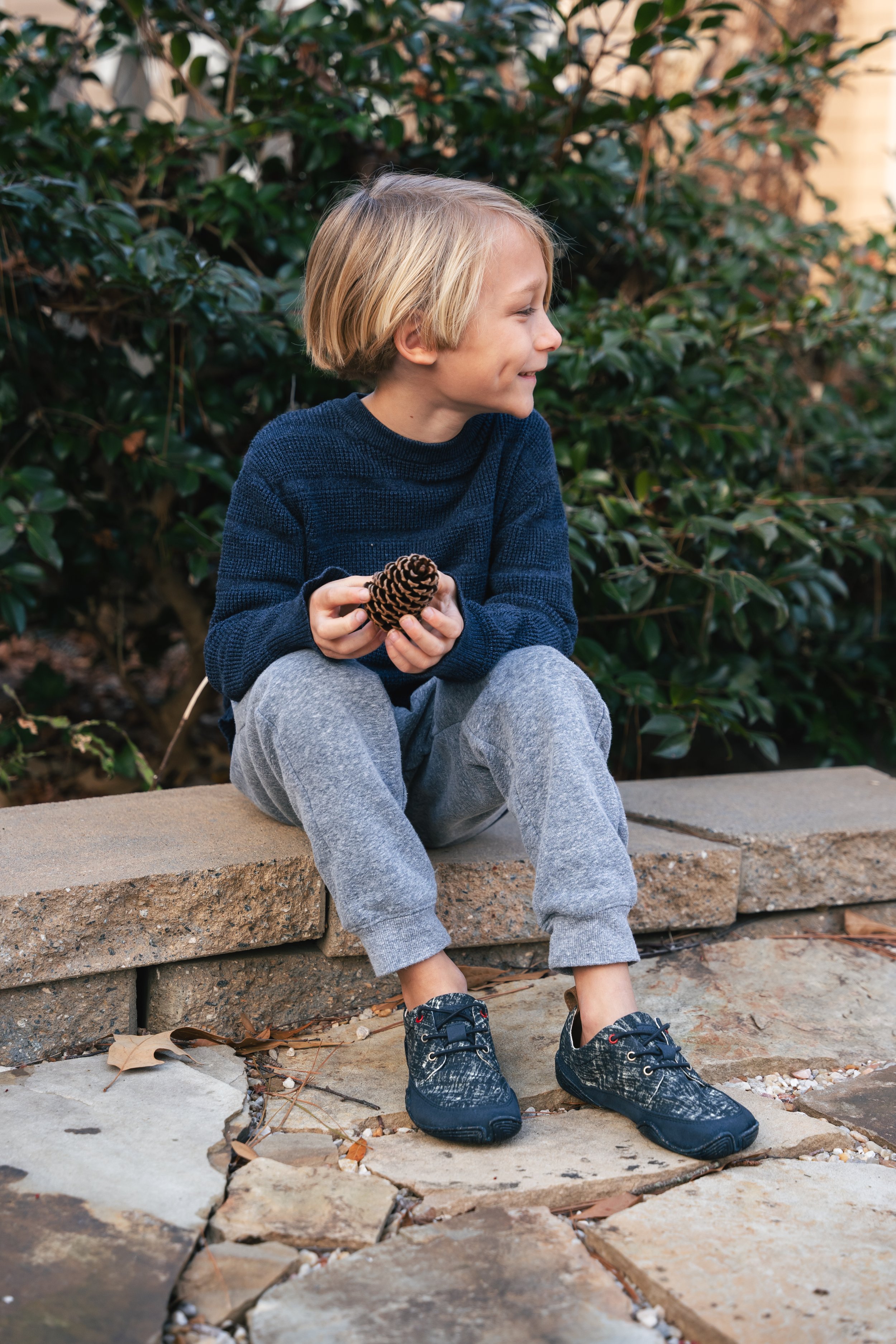INTERVIEW #70 WILDLING SHOES
Photo: Barefoot shoe guide
Based in: Engelskirchen, Germany
Founded in: 2015
Founded by: Anna Yona
Stores: Worldwide shipping via webshop and showrooms in Cologne, Berlin and Engelskirchen, Germany
Price range: 59 € - 149 €
Instagram: @wildling.shoes
Photo: Nicole Schnack fotografie
Hello, welcome to A Sustainable Closet! Who are Wilding Shoes and what are your brand values?
Wildling shoes are minimal shoes for children and adults and are handmade in Portugal with robust and durable materials, mainly from ecological natural materials - in compliance with fair working conditions as well as environmental standards.
We developed innovative, particularly thin and flexible soles, so they would have a positive impact on the feeling of walking and on your feet’s health. In contrast to conventional shoes, walking in minimal shoes enables a natural stride and thus brings back the joy of movement.
It is our vision to extend this positive regenerative impact to all areas we can influence as a company - to people, to the environment and also to the way we do business. We see Wildling Shoes as a pilot project for regenerative corporate management and embrace collaboration as a means to dismantle old systems and reimagine them.
These include fair manufacturing conditions, sustainable and innovative materials, renaturation projects, and New Work as our foundation for working regeneratively at all levels. Nearly 300 co-workers work in line with remote-first principles throughout Germany in pursuit of this goal.
You are using the word Regenerate, what does that mean to you?
Regeneration – that’s the idea that gave rise to Wildling. Our shoes are designed to help our bodies regenerate, to aid the rediscovery of the joy of moving naturally, and to connect us with the world around us by feeling the ground supporting our feet.
But we want to go further than that. We want to take responsibility and strive for solutions to the elemental challenges of our time – climate change and global injustice – which are intricately intertwined. Inspired by the principles of nature, we want to translate the regenerative impact of our shoes to our organization and the way we do business. We don’t merely want to minimize damage, but have a positive impact with every step we take: We believe to achieve this vision by e.g. growing our raw materials in regenerative agricultural systems that create abundance, by running on renewable energy, by actively rewilding ecosystems and by seeking radical collaboration and fair partnerships with like-minded people & businesses.
Photo: Sandra Chiolo
Photo: Cindy Winterfeldt
Can you please tell us more about your sustainability profile?
Early on we found our main production site in Portugal which could meet our self-imposed standards for fair wages, good working conditions & ecological consciousness. They were willing to develop ways of working with the innovative materials and unconventional approaches that we brought in. To this day, all of our shoes are produced in Europe.
We are proud to be the first German minimal shoe company to be B Corp certified. The complex process that includes inquiries about transparency, mission, employee & economic well-being as well as environmental impact and action has taken Wildling Shoes a total of three years to complete. One exciting insight that our team gained along the way: Taking progressive steps towards alternative and innovative business practices will not (yet) score any points in the certification process, but it nonetheless remains central to Wildling Shoe’s identity; e.g. we aim to find innovative ways to reduce CO2 – as opposed to offsetting it.
We are actively working to reduce emission sources through targeted investments in circular solutions, renewable energy, and renaturation, and by evolving its own supply chain to become a regenerative, circular system of value creation.
We know about and appreciate our responsibility that we have as a producing company to value resources and use them deliberately: Therefore we work solely with suppliers that share our ecological and ethical values such as Cotonea who provide us with certified organic cotton. In addition to the materials that are available throughout the global textile market we put effort into rediscovering old materials such as organic European hemp from a controlled collective local of farmers.
We haven’t achieved everything that we aim for yet: By 2025 we want all our materials to come from regenerative agricultural sources and we are helping to establish and finance these projects in Europe. We are also working with Rewilding Europe to regenerate the biodiversity in big natural ecosystems. In ten years we want to have helped return 500.000 hectares into truly wild spaces. We will also invest in circular economy and climate tech, to help not only our own company but the industry become more sustainable.
Photo: Cherie Birkner
Photo: Barefoot Shoe guide
Can you tell us more about the design and choice of collections?
The materials you choose when designing a product have a big influence on sustainability and ultimately on whether your impact as a company will be extractive or regenerative. A shoe is a very complex product and one that needs to withstand a lot of wear and tear. Since longevity is also a crucial sustainability factor, there are some parts of the shoe for which we need to use very durable materials that are generally not easily replaced with natural sources. For these parts (for instance, our outsole), we try to make sure to use only materials that can be easily recycled, and we try to use as much recycled material in the mix as quality and longevity allow. We design our outsoles to be separable from the shoe upper, so that we can return them to a recycling process. For the shoe uppers, we try to use only natural materials and to continuously replace materials of non-natural origin with newly developed alternatives.
Take the Washi material for example: Up to this point there are only a handful of companies next to us that dare to use the fibres of the Abacà plant to turn into a tightly woven but very light fabric for the shoe production. We find that placing reliance on more materials than the commonly known cotton also nourishes the interest of our customers about the fabrication of our shoes.
By 2025 we want all our raw materials and textiles to stem from regenerative agriculture and we are working to set up these projects with local farmers, cooperatives, and other companies. Our focus lies on hemp, wool, cotton, and Abacà (paper), and we take care to not only ensure that the projects have an ecological benefit on soil health, carbon storage, biodiversity, and microclimate, but also strive to take into account the social aspects and develop solutions for fair partnerships and future perspectives in close collaboration.
Many of our customers appreciate our collections to contain mostly vegan shoes as this complements their lifestyle. The exceptions are the wool-lined models from our winter collections for which we obtain organically produced wool from Northern Germany, Portugal and the Netherlands.
Where do you find inspiration?
The initial inspiration of our iconic split Wildling sole was the movement of soft fox paws on forest ground. That image is still accurate although the design of the soles and shoes has evolved through the years. In addition to that we (and our team) were and still are intensely inspired by the simplicity and close-to-nature work of Japanese designers and some of their traditional clothing. This is for example most visible in our most minimal shoes yet – the Slip-on models which are made from Japanese Washi material and come completely without eyelets or laces.
For every new collection we choose a topic to be inspired by for the colors and textures of our fabrics, always bearing the connection and appreciation of nature‘s constant change in mind. We welcome the transition of the shoes after they are bought and while they are worn carrying their owner through their individual environment. Therefore we find ourselves often choosing materials that actively change over time and thereby tell the stories the customers have experienced with it. Talking openly/transparently about this with our customers we receive their appreciation for this slightly different approach to fashion items being a companion in life.
Photo: Dirk Bruniecki
Who are your typical customers and where are they based?
Our typical customer is a sustainably conscious person with medium income, a parent and based in Europe.
What do you think needs to change in the fashion industry to make it more sustainable?
In order to change the fashion industry, we need to start to account for the true costs of each item - both ecological costs and also social costs. If these costs are not externalized but factored into the final price of the product, goods that are being produced in a resource intensive or unethical way will become much more expensive than sustainably sourced and fairly produced goods. Under these circumstances the market will regulate itself and ethical and sustainable behaviour will no longer be merely a question of mindset and responsibility, but become a prerequisite for survival.
Photo: Sandra Chiolo
What do you believe is “greenwashing” and what can producers and consumers do to avoid it?
"Greenwashing" is a company's attempt at portraying actions and products in a way that make them seem more environmentally sound than they are. This is usually done by overemphasizing and simplifying sustainable aspects, while covering up less sustainable facets and complexities. For consumers it is often impossible to judge the complex issues at stake and therefore hard to gauge the real impact of a purchase. I believe that we as producers have to become much better at providing a fully transparent account of our actions and their implications. Certifications and tools can help establish transparency, but due to the myriad of different certifications and seals often rather add to the confusion. I believe that once there is a significant number of brands displaying real transparency, it will become harder for other brands to get away with greenwashing.
If I buy your shoe, can I repair or resell it through you and how long will it last?
Wildling Shoes can last for years and indeed customers have been reselling their shoes through Facebook groups and other communication platforms or market places. We encourage this sustainable way to handle pre-worn fashion and give other people the possibility to experience this minimal feeling.
Our minimal shoes are ideal to resell because of their softness. They take the shape and compliment the movement of any individual who wears them. Even if they were worn by someone else for a considerable amount of time, they will still adapt and take the shape of the new owner almost instantly. So whether it’s a new shoe or a second hand (or foot) one, in Wildling’s case, both will provide good footwear options and that is indeed what we encounter.
We’re currently working on an in-house repair service that will be ready to use next year. In the meantime we are also collaborating with several University student groups that want to test the possibility of a shoe rental service.
As we consider ourselves to be part of the change of the fashion industry we are open for innovative approaches to keep wasted material to a minimum.
Photo: Sandra and Stefano









